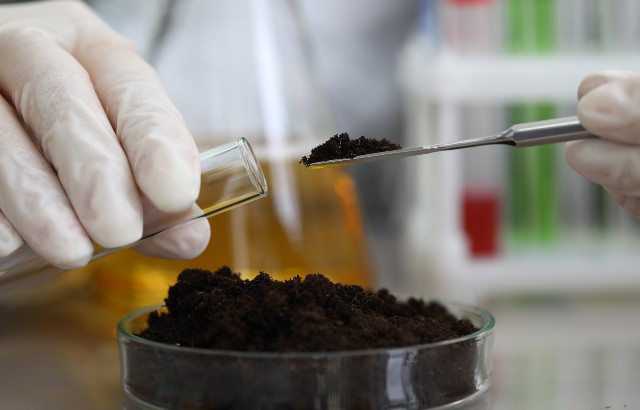Soil bacteria can survive on air – and help to regulate climate change
Soil plays a bigger role in regulating climate change than previously thought according to a new study co-authored by an academic from Queen Mary University of London.

Soil sample in a laboratory
The research found that over 70 per cent of soil bacteria are capable of living off the small amounts of hydrogen, carbon monoxide and methane in the air, helping to regulate atmospheric pollution.
Gas meeting energy needs
The findings, published in Nature Microbiology, reveal that as many as 19 different bacterial groups (or phyla) can survive on small gas amounts, suggesting that oxidation of most of these trace gases is a generalist process, rather than a specialist one as previously suggested.
Dr James Bradley, Lecturer in Environmental Science at Queen Mary University of London and co-author of the study said: “We commonly think of organic carbon being the primary source of energy to soil microbes. Our research shows that in fact, these soil microbes use trace gases such as hydrogen to meet their energy needs.
“The reaction of hydrogen and oxygen releases a lot of energy – enough that it is commonly used in aerospace engineering to propel rockets into orbit. We now know that these alternative reactions are prevalent among soil microbes, and supply at least enough energy to meet their basic energy needs.”
Dr Bradley's previous research on seafloor sediment, published in 2020, revealed implications for potential life in other parts of the solar system.
Implications for understanding bacteria
Led by Dr Sean Bay, Dr Eleonora Chiri, and Associate Professor Chris Greening from the Biomedicine Discovery Institute at Monash University, Australia, the latest study has implications for understanding how bacteria survives. “The observation that trace gases may sustain most soil bacteria has broad implications for understanding how bacteria shape the composition of the air we breathe, and for understanding microbial biodiversity and resilience in a changing world,” Dr Chiri said.
With bacteria adopting this flexible diet it gives researchers a new understanding of how diverse and productive soils can be and how microorganisms adapt to survive in different environments. Bacteria with the metabolic flexibility to use both organic and inorganic energy sources are likely to have a selective advantage in soil environments.
In natural environments, most microorganisms are not growing and instead exist in various dormant states, kind of "hibernating" during difficult times. How they do so is not entirely clear, and yet, research on microbial metabolism often focuses on relatively few bacteria easy to grow in laboratory conditions, while overlooking the dormant majority.
“Our research is reshaping our understanding of how the dormant majority survives in soils, showing that its survival depends on a previously unrecognized metabolic flexibility”, Dr Bay said.
More information
Related items

12 May 2025
For media information, contact:

